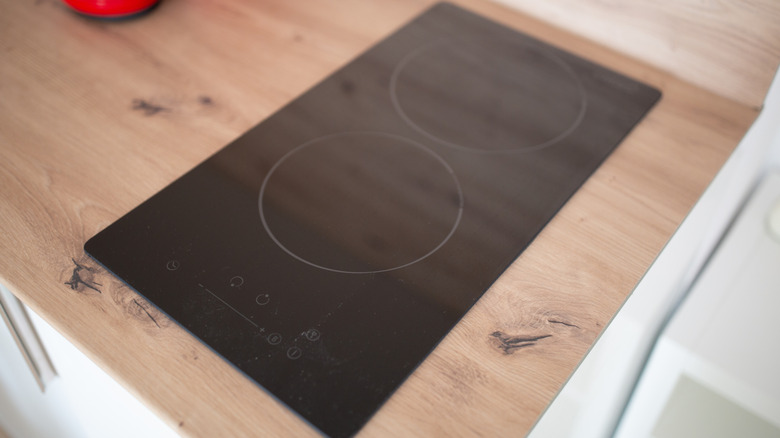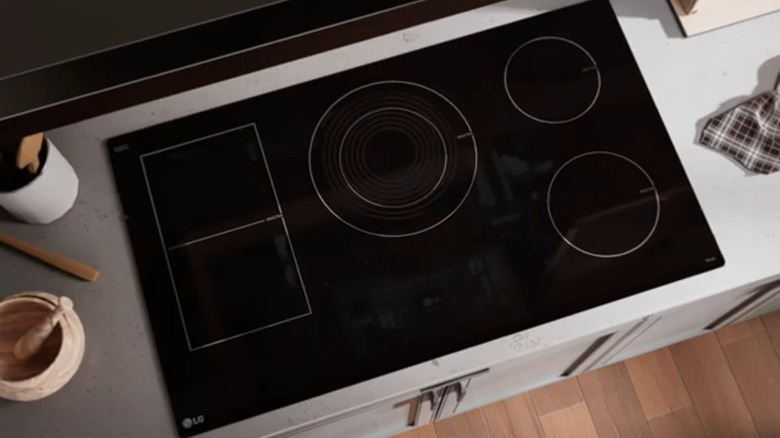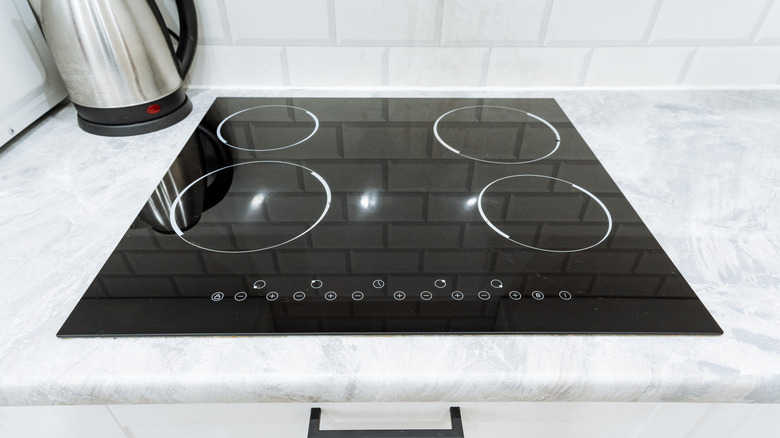Smart Induction Cooktops: The Good And The Bad You Should Know Before You Buy
We may receive a commission on purchases made from links.
In this age of innovation and invention, smart technology — tech equipped with enhancements like communication between devices and advanced functionality — is pretty much everywhere. Far more visible than the numerous smart gadgets you likely didn't know exist are smart thermostats, smart watches, and other commonplace tools that have been upgraded to better suit your needs. As it turns out, this rapidly expanding category of appliance has even made its way into the food preparation space, with smart induction cooktops gaining traction among amateur chefs and tech enthusiasts alike.
Though most find their traditional gas or electric stovetop to do the trick when it comes to making all of their favorite meals, the smart induction cooktop has its share of supporters out there. It's not hard to figure out, either, as these newcomers to the food preparation scene can do quite a lot, are compact, and boast some impressive connectivity features most stoves could only dream of having. At the same time, this is an emerging technology we're dealing with, so there are some drawbacks that don't make them an ideal fit for everyone.
If you're on the fence about giving a smart induction cooktop a try, here are some of the most prominent positive and negative aspects that you'll want to know about before you buy.
Smart induction cooktops are sleek, compact, and versatile
Folks have gravitated toward smart induction cooktops for a few major reasons over the past few years. For one, their shape and layout are major selling points, as they're smooth, sleek, and have enough space to work on multiple pots and pans of food at once. No crevices for crumbs, spices, and the like to get trapped in, and no raised burners — just easy cleanup. As far as when they're in use, you don't have to worry about them wasting energy, since they tend to be vastly more energy efficient than traditional gas or electric stovetops. Speaking to the smart aspect of these cooktops, they can connect over Wi-Fi to compatible apps like Home Connect and ThinQ to be monitored from a distance, activated remotely, and have issues properly diagnosed.
This is all well and good, but what about the act of cooking itself? Suffice it to say, smart induction cooktops deliver on this front and then some. With the benefit of induction technology, which uses a magnetic field to heat up induction-suitable cookware, you can enjoy the benefit of fast heating and cooling. Once a pot or pan is removed from the burner, the temperature drops in short order, reducing the likelihood of accidental burns. Temperatures can be changed on a dime as necessary, too. You can cook on the go as well if you opt for one of the highly-rated induction cooktops on the market today.
These points may present smart induction cooktops as a godsend in the kitchen, but they're not without some major drawbacks.
There are some notable drawbacks to smart induction cooktops
Getting into the issues with smart induction cooktops, price is the biggest barrier to entry. Yes, the cooktop itself can get expensive, with models like the Samsung 30-inch smart induction cooktop running just over $1,000, while the Thermador Freedom 60-inch smart induction cooktop flies past the $6,000 mark. However, the costs don't end there. Due to the nature of induction technology, very specific cookware is needed to take advantage of it. At the very least, you can test your current pieces to see if they're useable by simply trying to stick a magnet to the bottom of your pots and pans. If it magnetizes, it's good to go.
Aside from the associated costs, there's a major limitation of such a cooktop that must be addressed. Seeing as they're entirely reliant on electricity to function, should you end up in a power outage situation, you'll be unable to use it. Other frustrating elements of induction stovetops include their tendency to get scratched up over time due to them being glass, the distracting buzzing, humming, and fan-spinning sounds that come from them, and the necessary learning that comes with them. Faster heating and cooling times, touchscreens, and the like can cause chaos in the kitchen for those unprepared.
With all of these pros and cons in mind, hopefully, you have a good idea of whether a smart induction cooktop is right for you. If you feel the price, capabilities, and setup are your thing, excellent. If not, you can always go back to the old electric versus gas stove debate before settling on a new cooking unit.


